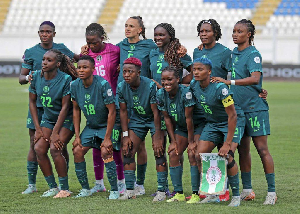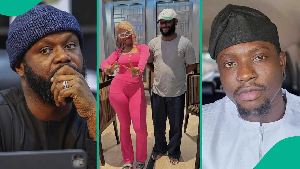General News of Monday, 24 November 2025
Source: www.arise.tv
Nnamdi Kanu's trial violated criminal law principles - Constitutional lawyer
Constitutional lawyer and public affairs analyst, Fred Nzeako, has declared that the conviction of IPOB leader, Nnamdi Kanu, amounts to ‘a travesty of justice’, insisting that the presiding judge acted outside the law and that the entire procedure was fundamentally defective.
Speaking in an interview with ARISE News on Sunday, Nzeako said the key question before Nigerians was not whether Kanu defended himself or dismissed his legal team, but whether justice was served at all.
“What now bothers many Nigerians was what happened on November 20th, the day he was convicted and eventually sentenced,”he said.
“Whether the court followed the law, or whether the court followed the personal opinion of the jurist, or whether the court, in some people’s opinion, acted on a script to ensure that Nnamdi Kanu is taken off the streets. Whether Nnamdi Kanu defended himself or not, what to many people is more critical and more important is the attitude of the judge and the justice of the matter.”
He argued that the requirements of criminal adjudication were not met.
“Don’t forget that in criminal adjudication, one can only be convicted when there is preponderance of evidence and when the prosecution is able to prove the case beyond all reasonable doubt,” he said.
“Justice must not only be done, but be seen, manifestly seen, as having been done. The majority of the public of Nigeria, and even the international community, do not believe that justice was done in Nnamdi Kanu’s case.”
Nzeako insisted that many Nigerians were confused because Kanu appeared to be charged under a repealed statute.
“People were at a loss as to why a man would be charged for an offence that is not known to law,” he said.
“A Nigerian statute book says one cannot be tried for an offence not codified and known to law.”
He emphasised that Kanu’s original discharge and acquittal made the old charge legally defunct.
“Don’t forget that Nnamdi Kanu had earlier been discharged and acquitted by the Federal High Court,” he said.
“The moment an accused is discharged and acquitted, the court becomes functus officio. You can no longer hold on to that old law. But by the time you saw the judgement from the Omotosho court, it referred to the 2013 charge. That became a very strong issue against that judgement and against the entire procedure.”
Nzeako strongly criticised the judge for directing the conditions of Kanu’s confinement.
“The judge committed what the majority describe as a travesty of justice,” he said.
“He jumped into the arena. He even usurped the office of the executive. It does not lie in the purview of the court to decide where a convict will be kept. The moment you give your judgement, you become functus officio. For the judge to say he has to be kept in a certain form of confinement, he is overreaching his office.”
He added that such an order may have influenced the decision to transfer Kanu to Sokoto.
“People were asking: would he be taken to Robben Island in South Africa or Guantanamo Bay in America since they wanted him to be completely out of circulation?” he said.
“Now the government has thrown him to Sokoto. What is the basis? You can query the judge for making such statements.”
He noted that most counts in the charge centred on Kanu’s broadcasts.
“Almost five of the counts talk about his broadcasts,” Nzeako said.
“That is why his lawyer said: ‘how has mere word of mouth amounted to terrorism?’ When you talk about criminal issues, you talk about the actus reus and the mens rea — the mind to commit the act and the act itself. Where is the act? Where is the mind? What he did was insult the authorities because he felt he was not getting what he expected from the system.”
Nzeako urged the legal team to move quickly.
“They will go on appeal and they have to do so timeously,” he said.
“Now that the written judgment is out, they get a copy, sift through it, bring out all the grounds of appeal and file. That is the only way forward.”
He also appealed for calm.
“I appeal to Ndigbo to take it easy. This injustice cannot stand. There is no need trying to resort to self-help. The law, yes, is an ass, but the same law will be utilised to right the wrongs done against Nnamdi Kanu.”
Nzeako said the executive now had the opportunity to resolve the impasse.
“The buck now stops on the table of the Commander-in-Chief,” he said.
“When he pardoned some criminals and Nigerians asked why he was not pardoning Nnamdi Kanu, the handlers said the matter was in court. Today, the court has discharged the matter. The executive can now apply the prerogative of mercy. If I am to advise him, I’ll ask him to do so and free him now.”
He warned that Kanu’s continued detention risked worsening insecurity.
“It is like pouring fuel into a raging fire,” he said. “Insecurity is mounting all around the country. Let us not add to the problems.”
Turning to the crisis in the Peoples Democratic Party (PDP), Nzeako offered a blunt assessment.
“They need to go back, talk to themselves, look themselves in the mirror and talk honestly,” he said.
“Greed has allowed some of them to be lured by the ruling party into causing problems in-house. If they stood their ground, the APC would fail.”
He added: “If a man doesn’t have self-greed, you cannot use him to cause problems in his own house. Once you open your eyes to see the movement of Ghana-Must-Go bags, your house will collapse.”
On the worsening insecurity and US interest under a possible Trump return, Nzeako was scathing.
“Res ipsa loquitur — the action speaks for itself,”he said.
“It is visible that even the blind can see that the government is not doing enough. Government is majoring in the minor. Instead of tackling insecurity, they are spending time and resources placating America, which has said it is ready to come to our rescue.”
He argued there was nothing wrong with accepting US assistance.
“Is there anything wrong with allowing America to remove that cancer troubling Nigeria since 2009?” he asked.
“America has never said they want a regime change. They have never said they want our resources — resources stolen by other nationals in collaboration with the Nigerian elite.”
He pointed to the week’s security incidents:
“In one week, over 300 students were kidnapped in Niger State — the highest ever. A litany of kidnappings and killings. If government was doing enough, we wouldn’t be here today.”
He concluded with a warning:
“Politics is subservient to good governance. Once you play politics above good governance, your house will begin to leak. And that is why the Nigerian house is leaking today.”












